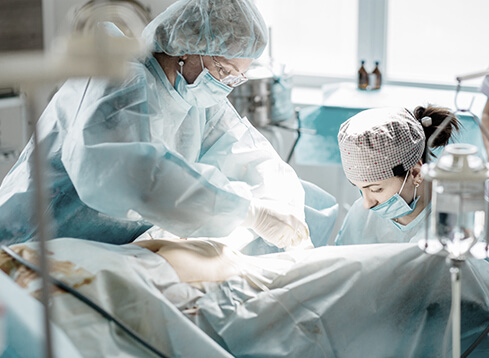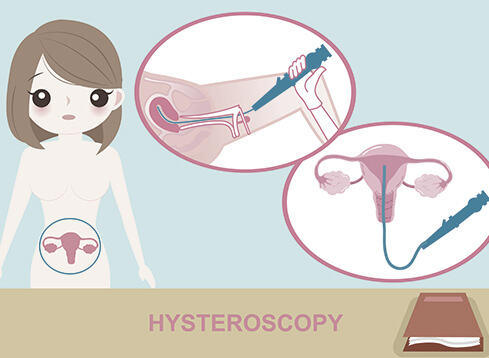Hysteroscopy is a minimally invasive procedure to diagnose and treat problems of the uterus. Hysteroscopy a surgical operation to remove all or part of the uterus. A hysteroscope is a thin telescope-like device with camera and light source which is inserted in the uterus through the vagina. No cutting or incision is given in vagina or cervix when inserting the thin hysteroscope. The image of your uterus is transmitted onto a video screen and the diagnosis is made. Any problem can also be corrected at the same sitting if required. The procedure can be recorded for future reference.
In certain advanced setups, hysteroscopy is done in OPD setting without anaesthesia or sedation, using very fine calibre hysteroscopes, hence reducing overall side effects of anaesthesia and overall cost of procedure. In almost all of the cases you may resume your normal activities very soon after the procedure. This procedure is gaining immense popularity in many countries, owing to its low cost and almost nil complications and morbidity following the procedure.

Hysteroscopy is done when a woman experiences certain set of symptoms and gynecology endoscopic surgeon chooses to examine the uterine cavity to eliminate the possibility of any great risk to the health of the woman or when there is a need to decide for a major surgery.
One of the most common uses of hysteroscopy is to find the cause of abnormal uterine bleeding (AUB) and take the endometrial biopsy under vision. Other conditions where hysteroscopy is used are-
A hysteroscopy is performed as an out-patient or day care procedure and you are discharged with in few hours on the same day.
Before starting the procedure, medication is given to help you relax. Local or general anaesthesia may be given depending upon the indication and whether the procedure is performed as an outpatient or in operation theatre.
Usually the hysteroscopy procedure takes 5-30 min and no incisions or cuts into the skin are involved. As the procedure is generally not painful most of the time anaesthesia is not required and any discomfort can be prevented by taking pain killer one hour before the procedure. However, a local anaesthesia can also be given to numb the cervix.
In some cases general anaesthesia is required as in when removing fibroid. When under general anaesthesia you will be asleep during the procedure.
Proper counselling is given before every procedure.

The pain felt by a woman can very considerably during the procedure. Some may feel no pain at all, some will have mild pain and some have considerable pain. You can discuss about your anxiety and pain relief with your doctor or nurse before the procedure. Queen’s Gynecology is reputed for hysteroscopic surgery in South Delhi in Delhi NCR area.
You will be able to go home few hours after the outpatient procedure. If hysteroscopy is performed under general anaesthesia you may have to wait till the effects of anaesthesia are over and you are able to drink, eat, walk and pass urine. In both the cases you will be discharged on the same day.
The recovery is usually quick, it is normal to have minor cramping and minimal bleeding or bloody discharge following the procedure. It might persist for few days and medications may be given to ease the symptoms. Your menses may also come at a different date.
Most women resume their normal activity the following day, however some are back to the work on the same day.
Hysteroscopy is a very safe procedure. Complications during or after the hysteroscopic procedure are uncommon when performed by an expert surgeon. However, like any other surgical procedure there are small risk. Most common among them is accidental uterine perforation or cervical injury. Other complications that may occur are:
You should not undergo hysteroscopy or uterus removal if you are pregnant as there are chances of miscarriage. Please inform you doctor about your pregnancy.
Uterus removal surgery cost depends on the country, state, city, gynecologist fees, surgeon fees, the anaesthetic fees, hospital charges, no. of clinical tests performed on the patient, type of room booked for after surgery accommodation, medicines, complications arising during or after the surgery, Use of ICU in critical cases etc. There are a variety of hospitals ranging from economical to super luxury for Uterus removal surgery in Delhi. A patient can connect with our Laparoscopic Uterus removal surgeon and discuss their budget for the Laparoscopic hysterectomy surgery or keyhole surgery.
The safest, least invasive and most cost-effective procedure of uterus removal is a vaginal hysterectomy uterus removal surgery. In this procedure, the surgeon removes the uterus through the vagina, using a laparoscope. It is a major surgical procedure which should be performed by an expert surgeon to avoid risks and side effects. Heavy bleeding and infection around the incision site are the commonly observed risks in some patients. Most female patients go home 2 to 3 days after this uterus removal surgery, but the recovery takes from 6 to 8 weeks. During these 6 to 8 weeks, one need to take complete rest and should not be involved in housework until you talk with your surgeon/doctor.
1. How much does hysteroscopic surgery cost in India?
The cost of hysteroscopic surgery in India can vary widely depending on factors such as:
If you are considering hysteroscopic surgery in India, contact Queen's Gynecology for an accurate cost estimate and consultation.
2. How long is recovery after hysteroscopy?
Recovery after hysteroscopy typically ranges from a few hours to a few days depending upon person to person. For diagnostic hysteroscopy, patients often experience minimal discomfort and can continue regular activities the same day. More complex procedures like hysteroscopic myomectomy or polypectomy might require 1-2 days of rest and limited activity.
Mild cramping, spotting, and discharge are common but generally subside within a week. Patients should avoid strenuous activities, sexual intercourse, and tampon use for about a week. Individual recovery times can vary, so it's important to follow the surgeon's post-operative instructions and attend any recommended follow-up appointments for a smooth recovery.
3. Is hysteroscopy a major surgery?
Hysteroscopy is typically regarded as a minimally invasive procedure rather than a major surgery. It involves inserting a thin, lighted tube (hysteroscope) via the vagina and cervix in the uterus to diagnose or treat issues like polyps, fibroids, or abnormal bleeding. Unlike major surgeries, hysteroscopy usually doesn't require large incisions and is often performed on an outpatient basis.
Recovery times are relatively short, and the risks of complications are lower compared to major surgical procedures. However, the complexity of the procedure can vary, and some cases may involve more extensive intervention, potentially shifting them toward a slightly more significant surgical category.
4. Do you need bed rest after hysteroscopy?
In most cases, bed rest is not typically required after a hysteroscopy. After the procedure, patients usually spend a short recovery period in a clinic or hospital setting to monitor their condition. While some rest is advisable to allow the effects of anesthesia to wear off and to manage any initial discomfort or light bleeding, complete bed rest is not mandatory.
Many patients can continue their everyday activities, including walking and light tasks, within a few hours to a day. However, it's important to avoid strenuous activities, heavy lifting, and sexual intercourse for a week or as advised by the healthcare provider to ensure proper healing.